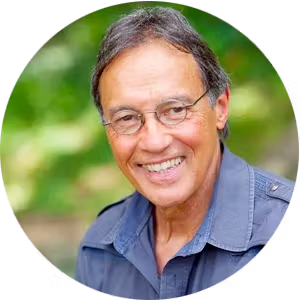Dr. Mario Martinez is a licensed U.S. clinical neuropsychologist and bestselling author of the book The MindBody Code: How to Change the Beliefs that Limit your Health, Longevity and Success. He is also a founder of the Biocognitive Science Institute and lectures worldwide on his research on the theory of biocognition. Mario has researched centenarians in five continents and has identified a cultural component of longevity and suggests that rather than genetics, healthy longevity is mostly due to cultural beliefs.
What is the difference between aging and getting old?
Dr. Martinez: That’s really a vital question that I asked when I was studying all centenarians. After looking at many cultures, and many people who are healthy and have been around for a long time, the way that I define the difference is very simple but profound. Aging is just time passing. You’re a day older than you were yesterday. There is nothing else, that’s the only contributor. But then the most important factor in aging is how you use that time, based on the beliefs that you assimilate from your culture. And that includes the food that you eat and the environment where you live. But most importantly, it is how you incorporate what I call the portals of growing older. And what I found from centenarians is that they live portal-less. ‘Cultural portals’ are like little fishbowls that you are put into based on your age. One of the first fishbowls is infancy, then there’s the child, then there’s the adolescent, the young adult, the middle age is a really important one, and then the elderly. But those are culturally-defined portals. The problem is and the consequences are that whatever portal you’re in, the culture will tell you how you need to act, how you need to look, even how you need to get sick, without you knowing it, that’s why I call it a fishbowl. Fish don’t know that they’re in a fishbowl. So there’s a fishbowl effect.

The most important factor in aging is how you use that time, based on the beliefs that you assimilate from your culture. And that includes the food that you eat and the environment where you live.
If you’re in the middle age portal, and something happens to you, you will identify yourself based on the attributions you give the portal you are in. So especially as you get older, if you are, let’s say 60, and your leg hurts, you immediately begin to think it has got to be arthritis, and you go to the doctor who will confirm this and say “Well, you’re 60, what do you want for your age?” As you get older, they start giving you false science. It’s not good science because as we grow older, you don’t have to get sick. It just depends on how you abuse your body or some of the genetic predispositions. So it’s very important to see what portal you’re in, and what kind of attributions you’re giving. When you go into middle age, you can look good and take care of yourself. You look young, and you dress young. And then they start saying “Well, do you want to look like a teenager, why don’t you dress your age? You want to go back to school. Why don’t you just save some money, so you can retire?” They admonish you back into the fishbowl. And after a while, you get in because you’re being pounded every day. After a while, you look at other people and say “Look, that person’s middle-aged and they don’t look young anymore.” You start buying it and the moment you do that, you’re beginning to age.
Centenarians don’t live in the portals. I’ve asked several centenarians and one of them was so funny. I said, “What is middle age in your world?” He said, “That’s a silly question. You find out when you die, you don’t know when middle age is.” They also, have a sense of prolonged time. They always think that they have time for everything. You ask them, what are you doing today? They answer, “Well, I’m doing this and in a year, I’m going to be doing this and that.” And they could be 104, it doesn’t matter. But here’s the important thing – geneticists and people who do geriatrics say, “It’s normal that when you grow older, to think that time is passing faster. That’s part of the brain.” They give you all kinds of false information, based on the premise that as you grow older, things happen to you. What happens is that it has nothing to do with aging. What happens is in the first 20/30 years, you think that time is really going very slowly, then later it starts getting shorter and shorter, and you figure “Well, this is my brain shrinking, or whatever it is.” It’s not that. It has to do with the novelty effect.

As we grow older, you don’t have to get sick. It just depends on how you abuse your body or some of the genetic predispositions.
From one to 30 you have your first love experience, your first kiss, your first love making, your first disappointment, your first marriage. Every first which is a novelty creates a sense of prolonged time. At 30, the novelty starts going down, you’ve been married already, you’ve done this, you can do that. And it seems to shrink time. But what happens to centenarians is they stay with novelty. They continue to elongate time. It has nothing to do with aging, it has to do with what you do with the world. And that’s an example of debunking all these false premises of the people that do the geriatrics. Geriatrics studies the pathology of aging. In biocognition, we study the causes of health as you grow older, they are completely different models. So that’s the idea between growing older and aging.
It seems that mindset is more important than genetics and you can program the way you age and the way your life is going to unfold.
Dr. Martinez: Yes, because you have genetic predispositions but you can trigger them or not, based on the causes of health. To give an example, the brain is always looking for an interpretation to give the body information. You can have what’s called ‘the demand characteristics’, what the environment will force you, or will entice you to think. You have a group of people and they have a doctor who is a culture editor who has power and authority. And the doctor says, “We’re going to give you an injection that constricts your bronchioles.” And although It’s just water, the bronchioles will constrict in 60 percent of people. But what is even more important, they’ll say we’re going to give you a constrictor and they give them an injection and it’s actually a dilator, and they have a constriction. It bypasses the biochemistry, and it goes with the cultural rules of the culture editor. So if you tell yourself something, and the culture editors confirm it, that’s what your biology will begin to believe. And that’s where you begin to express your genes into a propensity for this or that.

